11 Best Steelhead Jigs And How To Fish Them: Guides Advice
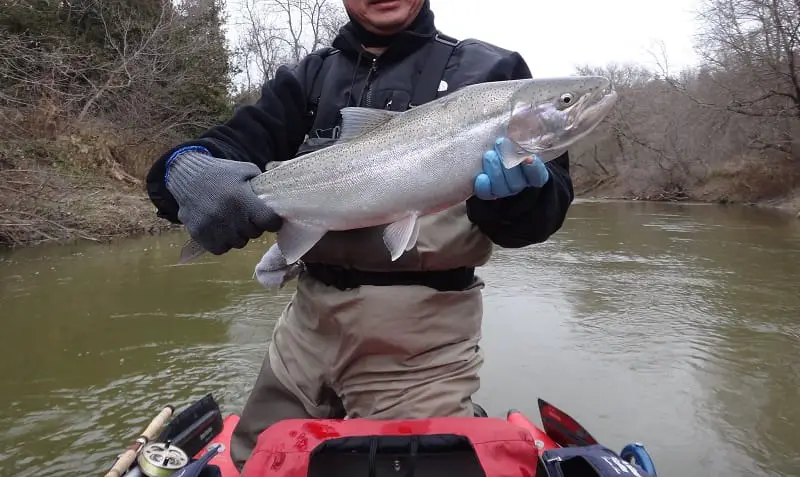
Anglers and river guides use two types of jigs when jig fishing for steelhead. Steelhead jigs have been my secret bait on many guide trips, and my clients often ask me which jigs I recommend the most.
Anglers can use marabou steelhead jigs under a float when fishing for steelhead and the best types of these jigs are the Jiggy Bugger Steelhead Jig or the Worm Jig. Anglers can also cast and retrieve swim jigs, and the best jigs for that are the KVD Swim Jigs and a simple paddle tail jig.
Steelhead Fishing With Jigs
Steelhead fishing with jigs is something I don’t hear about often because it is usually overshadowed by float fishing for steelhead, bottom bouncing for steelhead, and casting lures for steelhead.
The truth is that jig fishing for steelhead can be very effective. As long as I know which jigs are best to use with each method and what sizes and colors are best, jigs are very effective with all three methods.
What color jigs are best for steelhead?

I have caught steelhead on just about every color of jig I can think of but my most effective colors are black, white, pink, chartreuse, and olive. Different colors will work better at different times based on light conditions and on the clarity of the water.
The best color jig for steelhead on some rivers or when I’m fishing greenish color water is pink or black. When the river is off-colored and dirty I will use Chartreuse or red. For clear river fishing with jigs, the best colors are olive, black, and white. I rotate my baits and that includes fishing with jigs for steelhead.
I change sizes and colors frequently until I find out which one works that day. A color that works well in the morning under low light conditions may not work well mid-day in high sun, so change it up to see what they want.
It’s also important to change up the retrieve to determine if the steelhead wants a more aggressive retrieve or a slow and subtle retrieve. This can also depend on the time of day or light conditions.
What Size Jig Is Best For Steelhead
The size of the jigs that I use when I am float fishing is smaller and lighter than when I’m casting and jigging for steelhead. In fact, some jigs like Jiggy Bugger Steelhead Jigs hardly weigh anything at all, and I will often use these jigs on my standard steelhead bait leader, which already has weights on it.
The actual jig length I use when float fishing ranges from small Crappie-sized jigs that are about one inch long to larger Marabou jigs up to four inches long. On average, a 2 to 3-inch steelhead jig is best under a float, and a 3 to 4-inch steelhead jig works well when casting and jigging it.
The size of the jigs I use under a float is the 1/64 and 1/32 sizes the most.
When I cast jigs for steelhead, I will often use a 1/8oz to 1/4oz jig for the added weight so they cast further and so they get down to the fish faster. I will use a larger jig for faster and deeper water and a smaller jig, even one down to 1/16oz or 1/32 in shallow and slow water.
Jig Fishing For Steelhead Under A Float
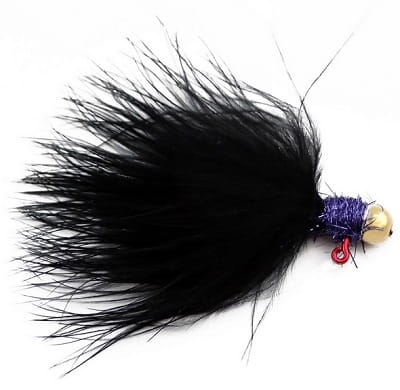
Float fishing for steelhead is often the most effective method and float fishing with jigs is the same as float fishing with any other bait with the exception of one tactic.
If I want my clients to catch the maximum amount of fish, it is critical they get a good presentation.
I tell my clients to learn and practice the fundamentals of float fishing otherwise they will struggle to consistantly catch fish.
I discuss my five fundamentals of good float fishing and my tactics and tips at; How To Float Fish.
Aside from just getting a good dead drift under the float with a jig, some anglers will try a jigging or stop-and-go method.
Jig fishing under a float with a jigging action takes some skill. The guys that do this well simply hold or pull back their float with the rod tip, which then lifts the jig, and then they release the tension on the line and the jig drops down. This is an up-and-down motion that can create life-like action on the jig.
When I do this, I can either hold the float for a second or two by stopping the line, which will cause the jig to swing ahead and rise up a little, and then when I release the float, the jig will drop again. This gives the jig a zig-zig up-and-down action. It also pulses the marbou and feather giving the jig a more “alive” look.
I can also pull the float back quickly with the rod tip without making a big splash on the surface (which could spook them), and then release it quickly to create a jumping action. Both of these methods create an up-and-down action that steelhead like.
Although giving the jig some action can be good, I have found that dead-drifting a jig under the float works best in a lot of situations.
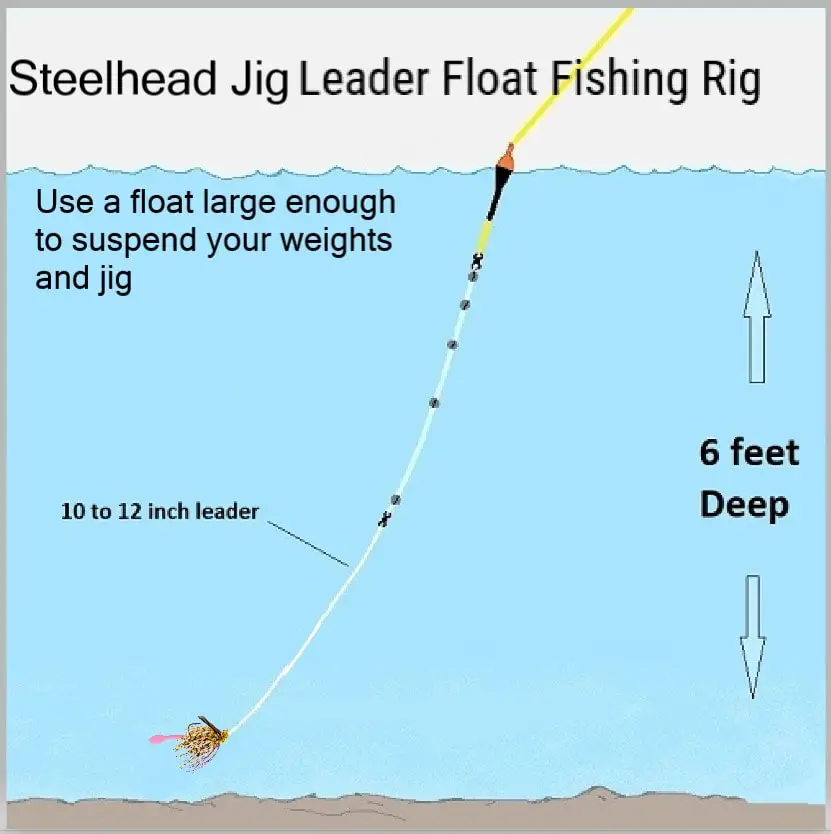
I do this the same way I would with a spawn bag, or worm, or any other steelhead bait. The current will move and pulsate the features and furs of the jig providing that “alive” look. See my best steelhead baits page for more on what baits I like to use and how I rig them.
When I dead-drift my jig I try to keep the jig six inches to 16 inches off the bottom and I ensure that I trott my float to allow the current to pulsate the fibers of the marabou of the jig and to slow the bait down in the current.
If you are not sure about trotting and slowing the bait and why this is very important, see my page Controlling Your Speed For More Fish When Float Fishing.
My favorite jigs to use for fishing steelhead under a float are smaller marabou jigs and worm jigs. These are my ten most effective jigs to use when float fishing.
- #1 – Jiggy Bugger Steelie Jigs – This has been my go-to jig for many years when I’m fishing jigs under a float for steelhead, but it has been hard to get so I have been using the VooDoo Custom Tackle Marabou Jig in the 1/64 and 1/32 sizes as a replacement. Check Price.
- #2 – Hawken Woolly Bugger Jig – Another great jig that has worked very well for me.
- #3 – Hawken Beau-Mac Marabou Steelhead Jig – A great jig for steelhead and one I use a lot for salmon
- #4 – Hawken AeroJig Marabou Jig – Lots of great colors including the famous Nighmare Jig color (Pearl-Flame-Black (Nightmare) Check Price.
- #5 – SPRO RkSTAR Steelhead Jig
- #6 – Bass Pro Shops Marabou Crappie Jig
- #7 – Jig head and grub or twister tail – Sometimes, a simple jig head and rubber twister tail or paddle tail grub can be hot.
- #8 – Anglers International Jiggy Hex – It’s more likef a fly but tied on a jig hook and it works well, especially in the spring when the bugs start becoming active.
- #9 – Worden’s Maxi Jigs are another great jig when float fishing or drifting for steelhead
The Nightmare Jig For Steelhead: A Hot Steelhead Jig
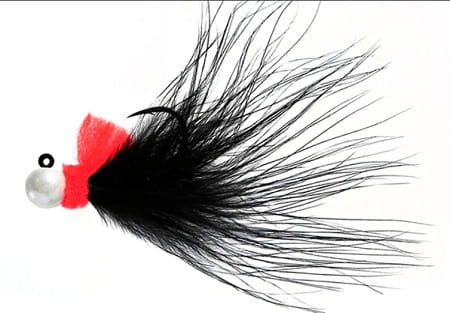
The Steelhead Nightmare Jig is a steelhead jig pattern that is very popular among steelhead anglers and for good reason, it works.
The original pattern is simply a white head, red chenille or yarn, and black marabou tail.
I have been tying this jig at home to test it out, and I have found that it is an effective bait to use under a float in very small sizes, but the Nightmare Jig for steelhead is a jig that is also meant to be cast out and jigged and retrieved on the swing.
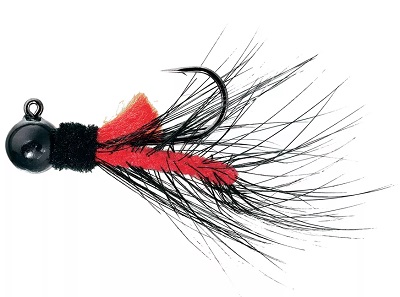
I have also experimented with this jig with black or red jig heads and also with silver and gold flash or tinsel all with good success.
Even extended red bodies and red in the tail can be effective.
If you don’t tie jigs and need to buy some of these, the best jig version to buy is the AeroJig Marabou Nightmare Jig.
See my float fishing and my casting steelhead jig set up below.
Casting And Twitching Jigs
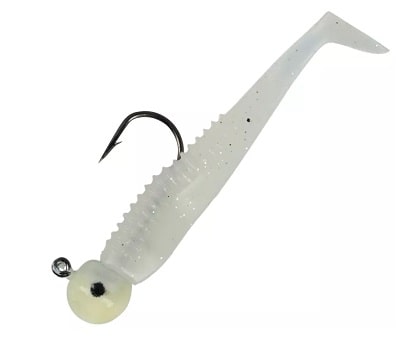
The other method that I use is to cast them like a lure and use a lift and drop jigging method. Some know this as twitching jigs,
How I do this is, I cast straight across the river and wait until I think my jig has hit the bottom and then reel up the slack and lift the tip of my rod 2 to 3 feet and then slowly lower the tip as I slowly reel in some slack, and then keep repeating until the jig is directly below me.
This method jumps the jig in an up-and-down motion as it swings its way across the river.
Dropping the rod tip too fast is a beginner mistake! If I drop the tip too fast, I put slack in the line and will not be able to detect the strike on the drop. The key is always to have gentle tension as the jig drops back down to the bottom.
Many river guides use this method of twitching jigs because it’s very effective. For more on this, check out Twitching Jig Methods For Steelhead.
When I cast and twitch jigs, I like to use swim jigs and jigs similar to those used by the bass and walleye guys.
Best Twitching Jigs
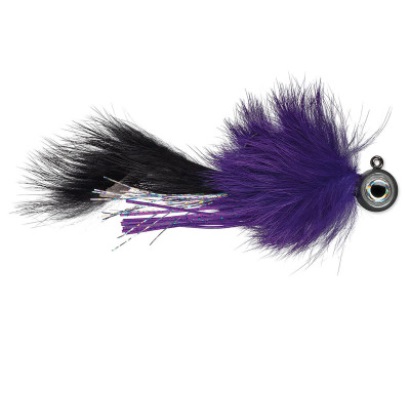
VMC Twitching Jig
There is a lot to like about this twitching jig which is why it’s my favorite.
- Big Eyes
- Sharp wide gap hook
- Rabbit hair and rabbit strip for body thickness, length, and life-like movement.
- Tinsel fibers, flashabou, and living silicone accents
- Lots of great colors
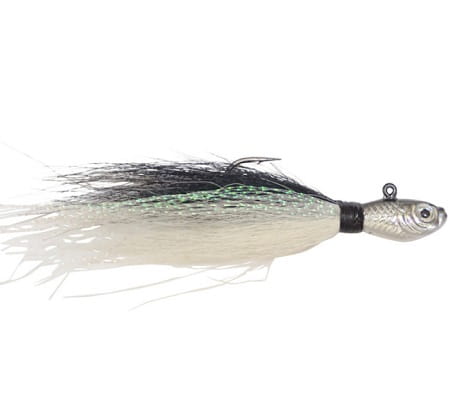
SPRO Bucktail Jig
Another great jig that is one of my favorite twitching jigs for both river and shore.
- made from bucktail for action, body, and length
- Sharp hook with a decent gap
- Lots of great colors and sizes
- Added flash
- Swim head and eye for unique swim action.
- Durable
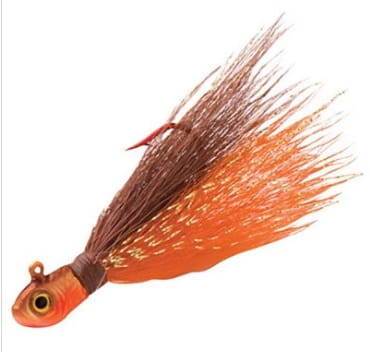
Northland Buck-A-Roo Jig
A twitching jig that is good for steelhead, trout, and salmon fishing.
- Mustad Ultra-Point hooks
- Good thickness and length
- Bucktail with flash for added attraction
- Lots of colors and sizes to choose from
- Large swim head with eyes
- Tip it with a twister tail or paddle tail
Other great casting steelhead and twitching jigs for steelhead:
- Mad River Steelhead Worm Jigs – This has been a great jig tail that I have been using for trout and steelhead over the last few years. For smaller trout, I cut the worm to the size I want.
- Booyah Baits Mobster Swim Jig – A great swim jig that can be fished alone or with a rubber tail or leech added.
- Strike King KVD Swim Jig – Another good swim jig with lots of good colors.
- One or 3-inch twister tails like the Mister Twister and paddle tail jigs like the Dr.Fish Realistic Jig, on a standard 1/4 to 1/2oz jig head are good jigs to try. Yellow and white single-tail twister tails can be hot.
See my casting steelhead jig setup below.
Steelhead Jig Heads
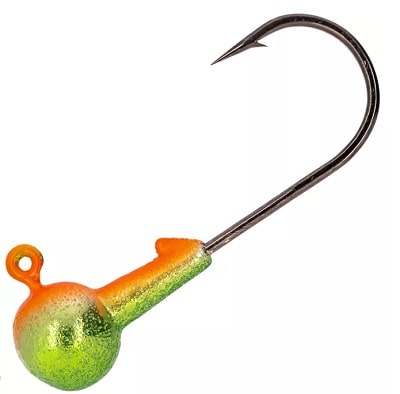
I ensure I am always using a good steelhead jig head in the right size and the right color.
I look for a hook with a wider gap for better hooking and holding.
For most rivers, when casting jigs with plastic grubs or twister tails, I prefer steelhead jig heads in sizes 1/8oz to 1/4oz, and some of the best jig heads for that are the Hawken AeroJig Jig Heads.
However, most any standard painted jig heads should do.
The size of the jig head will depend on the depth and velocity of the current. In slower shallower water or just slower water, I will often go with a lighter 1/4 jig head, but in faster water and faster and deeper water, a heavier head is often needed to get the jig down and working properly.
A couple of steelhead jigheads that I have been using the last few years that have been hot for me and are quickly becoming my favorites are the Eye Heads and the Chrome Heads. I’ll discuss these and the colors I like below.
What Color Jig Heads Are Best For Steelhead
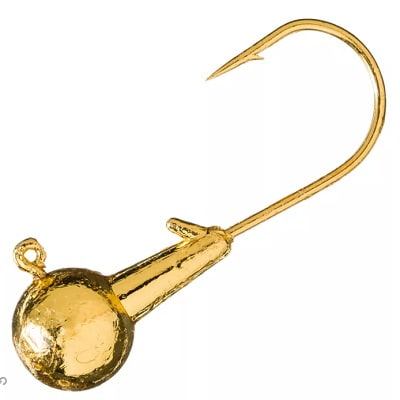
The color of the steelhead jig heads will depend on a few things which I will discuss shortly.
The most common steelhead jig head colors are white, black, and pink, and these colors can be combined with the same colored bodies.
An all black jig with a black head and a black body, or all white, all pink, or all chartreuse will work.
However, many anglers and I will use mixed colors, like a white or pink jig head on a black body or a pink or chartreuse head on a white body. Contrasting colors can trigger more bites at times.
In clear water conditions and if I think the fish are nervous and might be line shy I will often start with a more natural head and body color. Something that’s not too intrusive like a black head and a black body, or an olive or brown body. I have done well with black and olive combinations.
If the fish don’t eat the natural colors, I will start rotating colors and sizes to see what gets their attention. This is when a Pink head on a white body might work well.
When the water is green, off-colored, or even dirty, I will often use brighter more noticeable colors from the start simply because they stand out and get the steelhead’s attention. I will use steelhead jig heads in chartreuse, pink and reds in colored or stained waters, and will mix them with colored bodies, like a chartreuse head on a chartreuse or pink body.
In faster water, I will also often use brighter colors to grab the attention of the fish; however black on black or more natural colors can still work very well in this type of water.
Eye Jig Heads For Steelhead

Lately, I have been experimenting with chrome jig heads and eye-jig-heads and they have been excellent and are on my go-to list.
I really like the Z-Man Redfish Eye Jighead tipped with a twister tail, paddle tail grub, or steelhead worm. I will sometimes add a silicon skirt like the 6th Sense Silicone Skirt to them to give them some more life-like buggy action. I get my Z-Man Redfish Eye Jigheads and skirts at Bass Pro Shop.
Metallic Steelhead Jig Heads
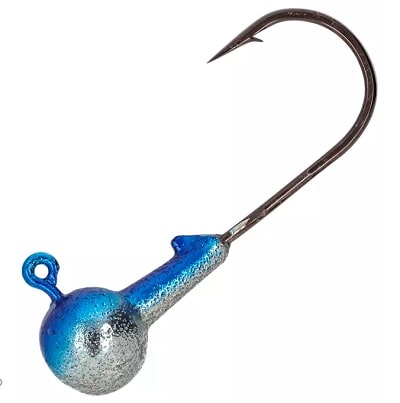
I have also done will with metallic jig heads like the Gold, or Silver blue, or Chartreuse green Cabela’s Metallic Round Jigheads.
These metallic jig heads give a little extra flash that attracts the steelhead. The white-blue jighead with a white body has been hot for fresh run steelhead.
I’ll sometimes run the 1/16 size under a float.
Steelhead Jig Patterns
Even though buying means you might be limited in jig patterns, sizes, and colors, there is another way to spice things up and increase bites.
Many steelhead jig patterns will be sold in one solid color, and others will have one color on the head and one color on the body. I add color to them by adding a colored twister tail, paddle tail, grub tail, or worm to add more size and color.
Most of the time, I find that steelhead jig patterns that are all one color will work better than multi-colored jigs.
I also prefer steelhead jig patterns that use marabou in the tail. The marabou gives the jig lots of action and movement like a creature with moving legs as the current passes over it. Oftentimes, no added grub or twister tail is needed because the marabou is more than enough.
The Steelhead Jig Setup
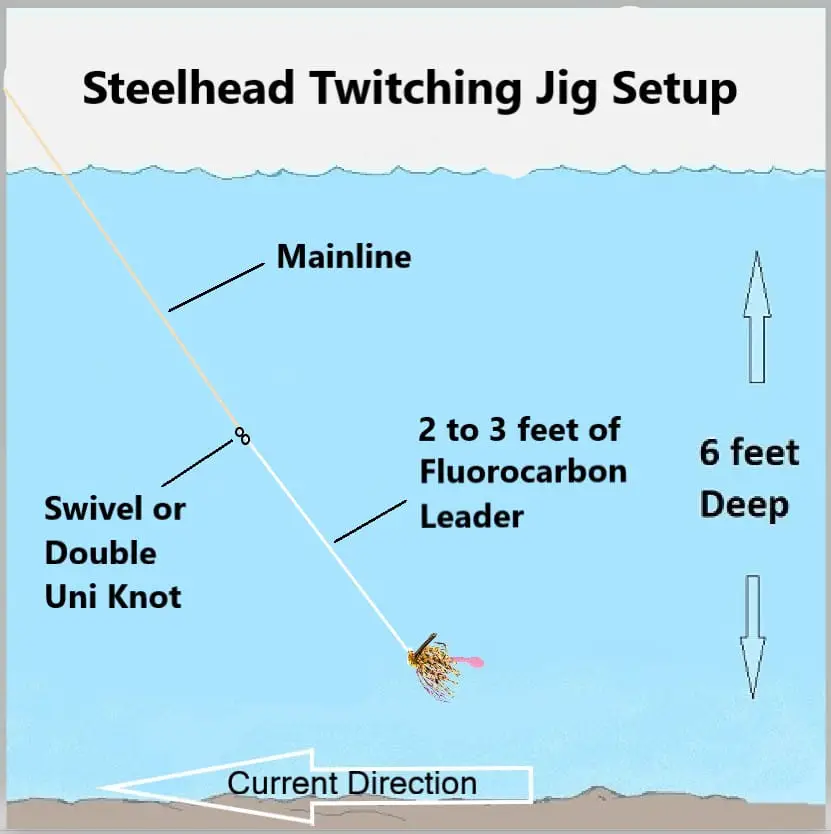
The setup I use for jigs is important but that’s a whole other article in itself.
I’ve added a second article with pictures and multiple diagrams on how I set up and fish jigs, see it at Steelhead Jig Setups.
Tight Lines,
Graham
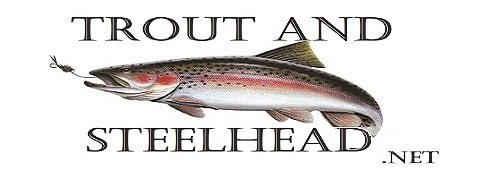
Do you tip your jigs with any bait, like wax worms?
Hi Kile,
I do not tip the jigs with bait because I have found that I don’t need to.
Graham
I fish the Salmon River in NY all winter and have fished this river since 1999 and before that I grew up in PA and fished for steelhead since a kid in high school. During the cold winter months there are caddis and small stone fly hatches and also scuds in the river bottoms. I absolutely have had days where wax worms made all the difference in the world. Using an olive marabou with black head 1/48oz jig I tie and nothing was happening, put a waxie on and first cast, fish. With plenty more to go after. I find that I always try things to gain my own personal perspective on what works and what doesn’t work. In PA as a kid I’d use Mini-Foo jigs with waxworms all the time and caught hundreds of steelhead that way. During the winter when the eggs are gone in river systems is when trout will then turn to act like trout. I tie small jigs on a size 12 jig hook and 1/8 bead heads with just a little bit of materials and steelhead love em. There are days waxies made all the difference for myself. I know they work and I have alot of confidence fishing jigs in January and February into early March. Graham, I read your articles, keep up the good info. It’s good to help people bro. Tight lines!
Hey Jessie, Great tips and advice, Thanks a lot.
Hi I was fishing the sandy river which is off the Columbia river and I can’t get the salmon or steelhead to bite on anything what should I do cause i have seen em
Hi Keegan,
It’s difficult to say since I can’t see what it is that you are doing. Generally, a well-presented bait should get them to bite. I would suggest reading this article and see if anything here will help.
Catch More Trout And Steelhead Garanteed
I have had good luck “mini jigging” for trout, both in still and moving water. Have you heard of anyone adapting this technique to great lakes steelhead?
I have used 1/2″ to 3/4″ mini jigs, and they definitely work.
Best of luck,
Graham
Fishing for Steelhead in the Pacific Northwest -where they originated before being transplanted East- is somewhat different and it should be noted that successful techniques and gear vary from one location to the other.
Great Lakes methods don’t always translate to the PNW, and vice versa.
Yep, I agree to a point.
I’ve tried west coast methods on great lakes steelhead and great lakes methods on west coast steelhead with similar results. Often, the same methods will work in both areas but the method, setup, and bait might need to be tweaked based on the water types.
I hope to eventually get more west coast and east coast specific and split articles like this one.
Graham
How about casting 1/32 jig heads with two handed switch rod?
I don’t do it so I cant comment, however, I don’t see why not. Maybe someone else can comment.
Graham